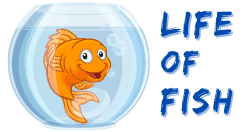Fish constipation is a common issue that fishkeepers must address. This can be a very serious problem if left untreated, as it can lead to the death of your fish.
There are many causes of fish constipation, and it can be difficult to determine the exact cause without examining your fish carefully. Fortunately, in most cases, constipation in fish is something that you can resolve easily. Let’s look at how to identify a constipated fish, some of the most common causes of constipation in fish, and some treatment options.
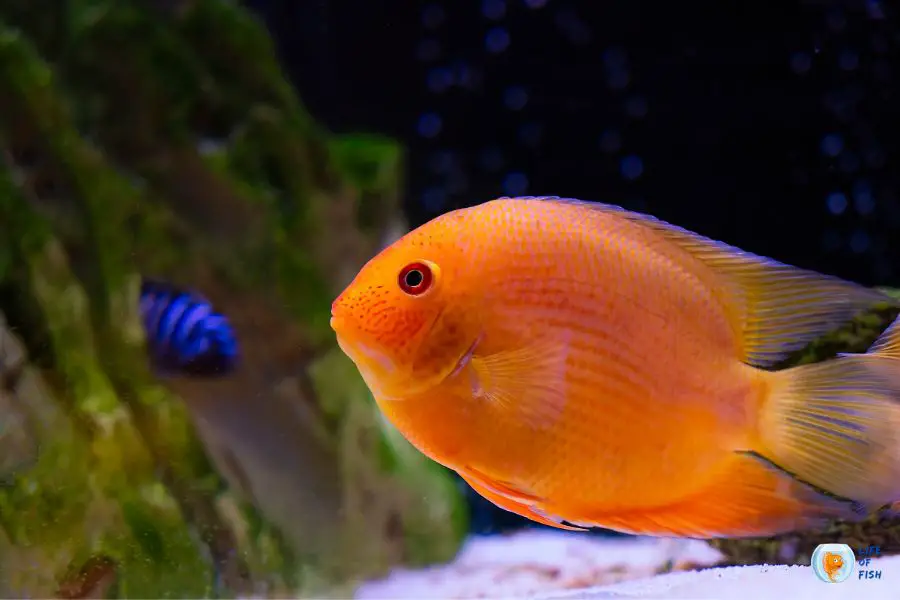
What Does A Constipated Fish Look Like?
Jump To
A healthy fish shouldn’t have feces that hangs out of its vent. If you see feces hanging out of your fish’s vent, this is a sign that it is constipated. The color of feces can be dark brown or white to transparent. In addition, you may notice that your fish’s stomach appears bloated. Swelling of the abdomen is a common symptom of constipation in fish. However, if you notice your fish is swollen entirely, that’s not constipation. That’s an illness called dropsy, which is a life-threatening condition.
When your fish is constipated, your fish may also exhibit other signs of illness, such as lethargy, loss of appetite, and listlessness. It may also have balance issues like swimming sideways or upside down. If you observe any of these signs, it’s important to take action quickly to treat your fish.
Causes For fish Constipation
There can be several causes of constipation in fish.
Incorrect diet
An incorrect diet is the prevalent cause of constipation in fish. A diet that is high in fat and low in fiber can cause your fish to become constipated. Depending on their eating habits, fish are divided into three major groups:
- Omnivores – which have a varied diet,
- Carnivores – have a diet mainly based on meat,
- Herbivores – have a diet based on plants.
Usually, carnivore fish have a short and large stomach that can digest protein-rich food more quickly. On the other side, herbivore fish have a long and thin stomach that is good for digesting plant-based food. Feeding a carnivore fish with a plant-based diet or the other way around can cause problems with their digestive system and result in constipation.
Overeating
Just like with people, overeating can cause constipation in fish. When a fish eats more than it can digest, the undigested food will sit in its stomach and cause constipation. If you’re overfeeding your fish, you’ll usually see uneaten food sinking to the bottom of the tank. Further, the tank will get dirty faster because the uneaten food will start to rot. A good rule of thumb is to feed your fish only as much as they can eat in 2 minutes. Any more than that, and you’re likely overfeeding them.
Poor water quality
Another common cause of constipation in fish is poor water quality. When the water in your tank is dirty, it can contain harmful toxins that can irritate your fish’s digestive system and cause constipation. Additionally, a dirty tank can also contain parasites that can infect your fish and cause constipation.
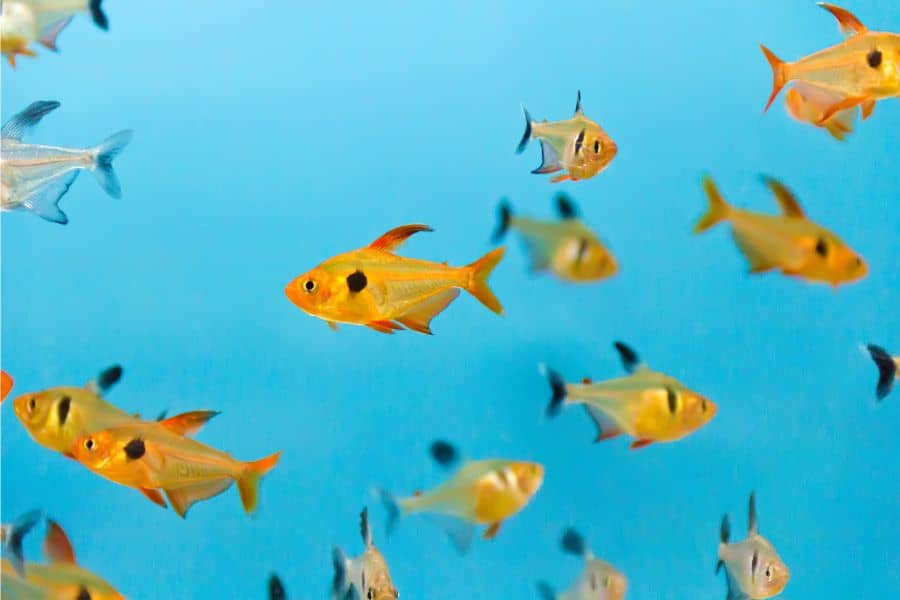
Temperature changes
Sudden changes in temperature can also cause constipation in fish. When the water in your tank is too cold, it can slow down your fish’s metabolism and make it difficult for your fish to digest their food properly. On the other hand, if the water in your tank is too warm, it can speed up your fish’s metabolism and cause them to produce more waste than they can handle. Either way, temperature changes can disrupt the delicate balance in your fish’s digestive system and cause constipation.
Stale or spoiled fish food
If you’re feeding your fish stale or spoiled fish food, this can also cause constipation. Stale fish food doesn’t have the nutrients that your fish needs to stay healthy, and spoiled fish food can contain harmful bacteria that can make your fish sick. Either way, it’s important to make sure that you’re feeding your fish fresh, nutritionally-rich food to avoid constipation.
Lack of fiber in the diet
A lack of fiber in your fish’s diet can also cause constipation. Fiber is important for keeping the digestive system healthy and regular. The digestive system can’t function properly without enough fiber, and constipation can occur.
Surface feeding
If your fish is a surface feeder, they may also be more prone to constipation. Surface feeders tend to eat more air than water, which can cause gas and bloat. Additionally, surface feeders typically eat smaller meals more often, which can also lead to constipation.
Physical blockages
Physical blockages can also cause constipation in fish. If your fish swallows something that they can’t digest, this can cause an obstruction in their digestive system and lead to constipation. Common blockages include gravel, stones, plants, and even other fish.
Physical deformities
Physical deformities can also cause constipation in fish. If your fish has a deformity in its digestive system, this can make it difficult for them to digest its food properly and cause constipation. Common deformities include kinked intestines, intestinal blockages, and tumors. Balloon fish and fancy goldfish are especially prone to kinked intestines, which can lead to constipation.
Internal Tumors
Internal tumors can also cause constipation in fish. If your fish has a tumor in its digestive system, it can block food passage and cause constipation. Internal tumors are relatively rare in fish, but they can still occur. If you suspect that your fish has a tumor, it’s important to take them to the vet for a diagnosis.
Swim bladder disease
Swim bladder disease damages the swim bladder, which is a sac-like structure that helps fish float. If the swim bladder is damaged, it can cause constipation in fish. Swim bladder disease is relatively common in goldfish and can be caused by a variety of factors, including genetics, poor nutrition, and physical trauma.
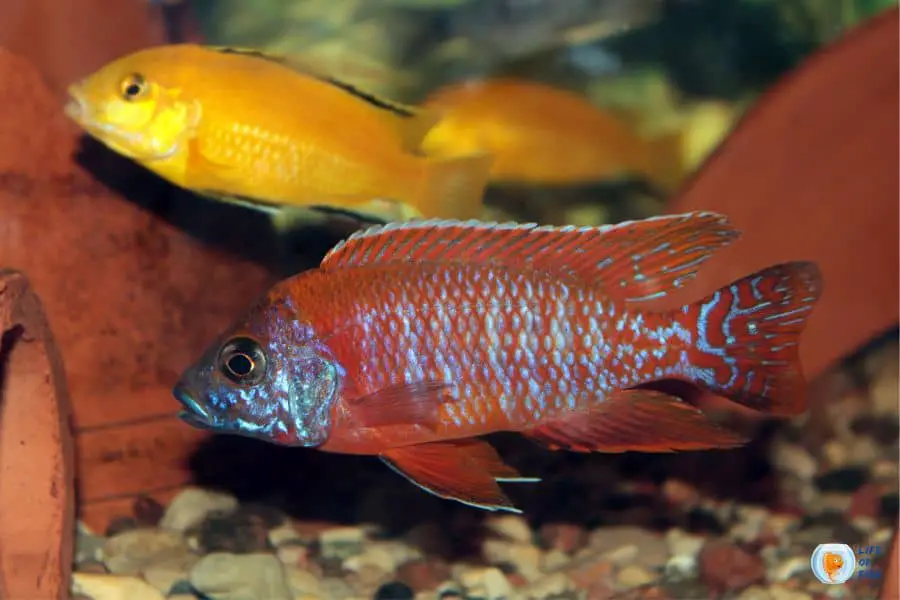
Stress
Lastly, stress can also cause constipation in fish. When stressed, fish release a hormone called cortisol, which can disrupt the delicate balance in their digestive system and cause constipation. There are a variety of different stressors that can cause stress in fish, including poor water quality, overcrowding, and changes in their environment.
Dangers And Side Effects of fish constipation
Although constipation is a curable condition, it can still cause various problems for your fish if left untreated. For one, constipation can lead to a build-up of toxins in the body, which can be harmful to your fish. Additionally, constipation can lead to more serious conditions like Hexamita, a parasitic infection that can be fatal. Further, some fish owners misidentify dropsy as constipation. While the two conditions share some symptoms, they are actually quite different.
Dropsy is a serious bacterial infection that causes fluid to build up in the body and can be fatal if left untreated. If you suspect that your fish has dropsy, it’s important to take them to the vet immediately. One side effect of severe constipation is raised or stuck out scales from the body. When this happens, the fish becomes susceptible to bacterial infections and might be unable to swim properly or eat. This can lead to malnutrition, hence stunted growth. Additionally, if constipation is not cured, it might eventually lead to organ damage and even death.
Treating fish Constipation
Fortunately, constipation is a treatable condition. If your fish is constipated, you can do a few things to help them feel better.
Feed your fish a balanced diet
First, you’ll need to make sure that they’re eating a balanced diet. A healthy diet is important for all fish, but it’s especially important for fish that are constipated. Give them plenty of high-quality pellets or flakes, and supplement their diet with live or frozen foods like brine shrimp, daphnia, or bloodworms. Additionally, you can add vegetables to their diet to help them get the fiber they need. Good options include zucchini, peas, and spinach.
In the wild, both herbivore and carnivore fish eat a significant amount of plants, which helps to keep their digestive system healthy. So, if you are giving your fish a healthy diet, some vegetable matter once in a while can only do them good!
Introduce live plants
Another way to help your fish with constipation is to introduce live plants into their aquarium. Live plants not only provide fish with a natural source of fiber, but they also help to keep the water quality in the aquarium clean and healthy. Some good options for constipated fish include Anacharis, Hornwort, and Java Fern.
Consider giving them a laxative.
If your fish is constipated and nothing else seems to be working, you may need to give them a laxative.
- There are a variety of different laxatives that you can give your fish, but one of the most effective is Epsom salt.
- To use Epsom salt as a laxative, add one teaspoon of salt for every 5 gallons of water to your aquarium.
- You can also add a bit of aquarium salt to their food to help them expel waste.
- Shelled peas also work as a natural laxative for constipated fish. Simply blanch the peas in boiling water for a few minutes, then mash them up and offer them to your fish.
- For carnivore fish, daphnia can also be used as a laxative. Daphnia is small, a freshwater crustacean that is high in fiber.
- To use daphnia as a laxative, feed your fish a few live daphnias daily.
- Monitor your fish closely
- Once you’ve started treatment, it’s important to monitor your fish closely to make sure that the constipation is resolving.
- If you don’t see any improvement after a few days, or if your fish’s condition is worsening, take them to the vet for further treatment.
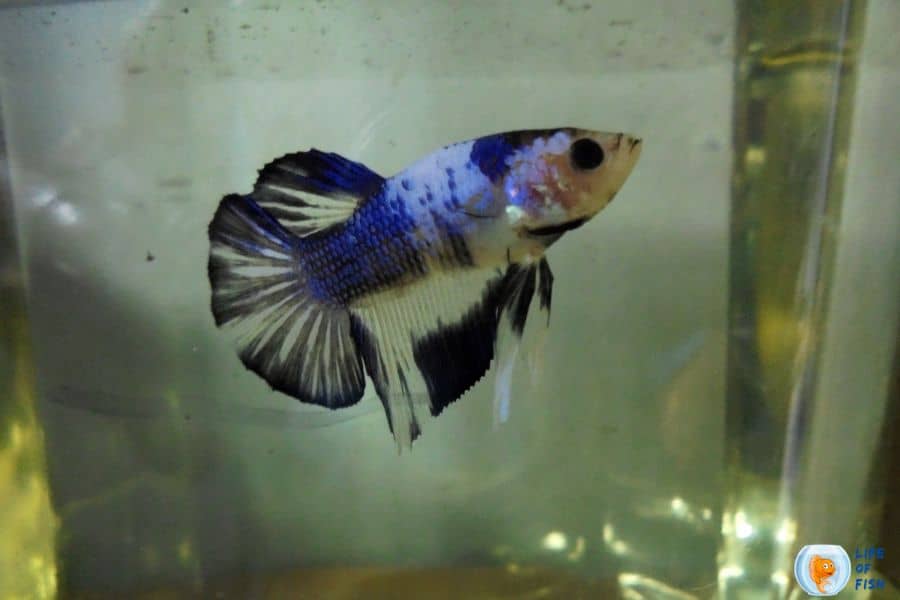
Preventing Constipation
Preventing constipation is easier than you think. Most commercial fish food lacks enough dietary fiber, so supplementing your fish’s diet with live or frozen foods is a good way to prevent constipation. Additionally, adding live plants to your aquarium will help to keep your fish’s digestive system healthy. If you have herbivore fish, make sure they get plenty of vegetation in their diet. Your tank may have enough algae, but algae don’t have all the nutrients that plants do.
Finally, don’t overfeed your fish. It’s important to give them enough food, but if you’re giving them more than they can eat, the excess will just end up going to waste and polluting your tank. In addition to taking care of your fish’s diet, you should maintain your fish tank regularly. A clean fish tank with no debris is very important for the overall health of your fish!
Conclusion
Fish constipation is a common issue, but it’s one that is easily preventable and treatable. Most of the time, all you have to do is change their diet and introduce some live plants into their aquarium. If your fish is constipated and dietary change doesn’t help, don’t hesitate to take them to the vet for further treatment. Keeping a few simple things in mind can help your fish stay healthy and happy.
Related question
Can You Squeeze A Constipated Fish?
No. Never try to squeeze a constipated fish. This can cause serious damage to their internal organs and make constipation worse. Even a “gentle” squeeze can be too much for a fish and cause them to die.
Can Fish Die From Constipation?
Yes, if left untreated, constipation can be fatal for fish. This is why it’s so important to monitor your fish closely and seek treatment if they seem to be constipated.
Can a fish survive dropsy?
Dropsy is a fatal condition that results in fluid build-up in the body. While there is no cure for dropsy, it can be treated with antibiotics. However, most fish that develop dropsy die within a few days.
Read Next : Do Fish Eat Snails? The Answer Will Surprise You
